Slide 1: Why is Your ‘Career Conversation’ a ‘Negotiation’ With Your PI?
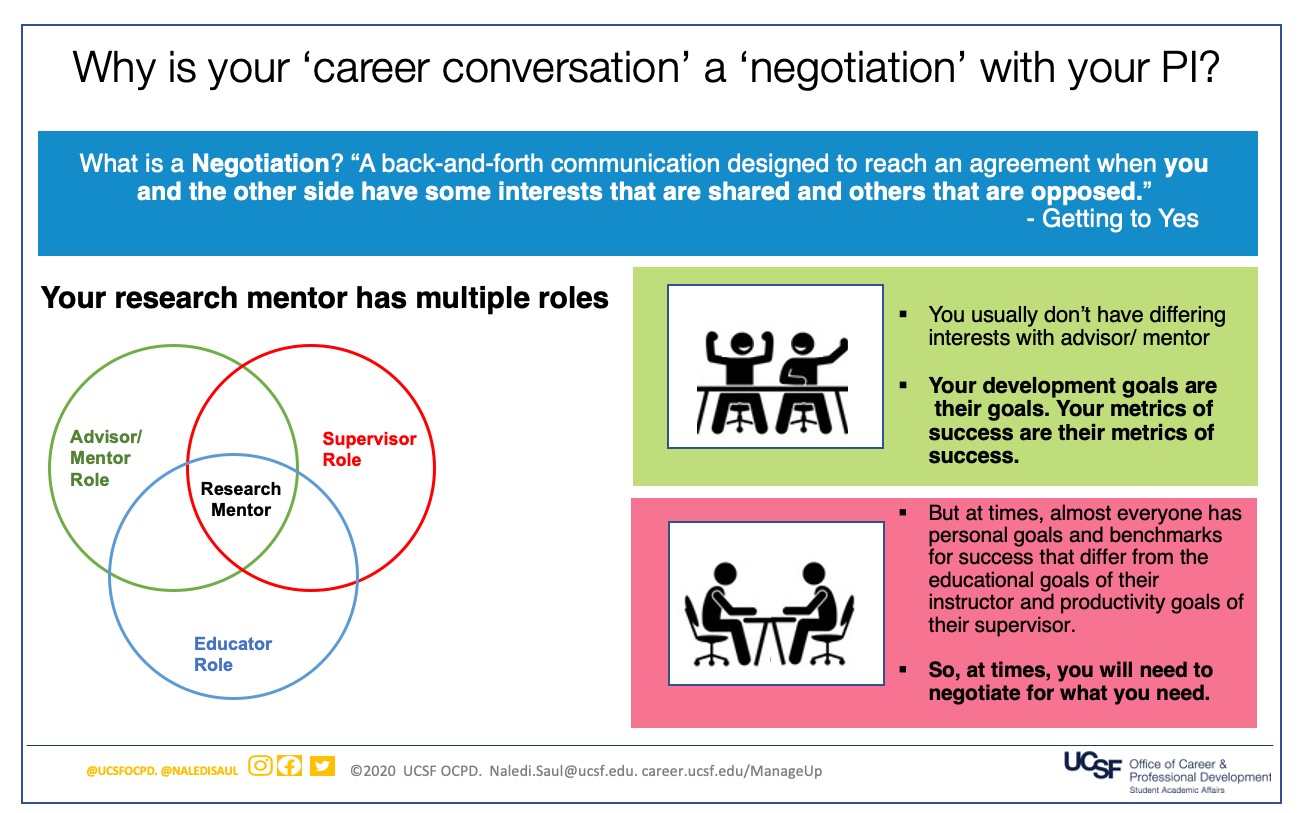 "What is a Negotiation? “A back-and-forth communication designed to reach an agreement when you and the other side have some interests that are shared and others that are opposed.” Getting to Yes
"What is a Negotiation? “A back-and-forth communication designed to reach an agreement when you and the other side have some interests that are shared and others that are opposed.” Getting to Yes- Your Research Mentor has 3 overlapping roles.
- They are: 1) the role of a mentor/advisor role, 2) the role o an educator/instructor, and 3) the role of a supervisor.
- You usually don’t have differing interests with a mentor: Your goals are their goals. Your metrics of success are for you to achieve your metrics of success.
- But at times, almost everyone has goals and benchmarks for success that differ from their instructor and their supervisor. Since faculty play all three roles, at times, you will need to negotiate for what you need.
Slide 2: Step 1: Prep for the Conversation
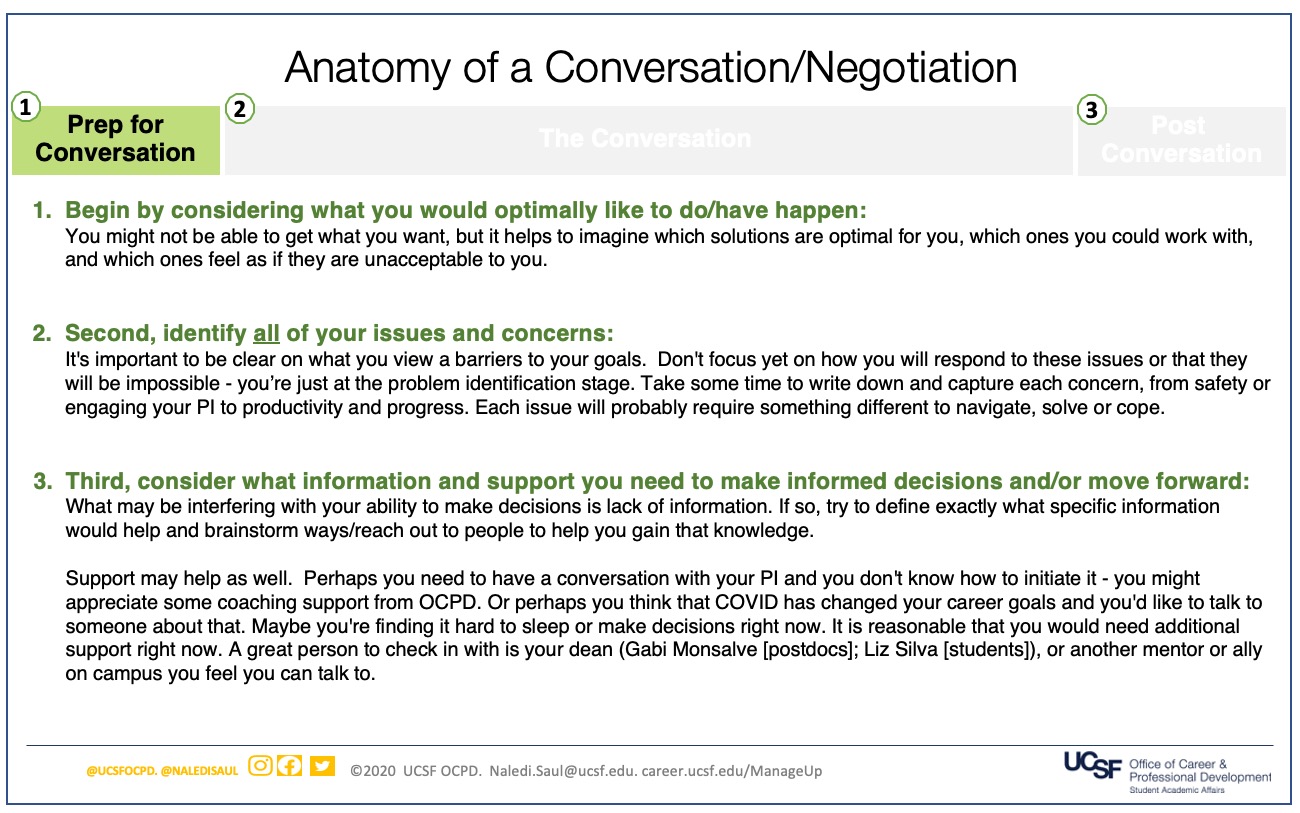 The Goal: Self-assessment: To explore your thinking, your preferences and your concerns and your needs and mentally get ready for your conversation.
The Goal: Self-assessment: To explore your thinking, your preferences and your concerns and your needs and mentally get ready for your conversation.
- Begin by considering what you would optimally like to do/have happen: You might not be able to get what you want, but it helps to imagine which solutions are optimal for you, which ones you could work with, and which ones feel as if they are unacceptable to you.
- Second, identify all of your issues and concerns: It's important to be clear on what you view barriers to your goals. Don't focus yet on how you will respond to these issues or that they will be impossible - you’re just at the problem identification stage. Take some time to write down and capture each concern, from safety or engaging your PI to productivity and progress. Each issue will probably require something different to navigate, solve or cope.
- Third, consider what information and support you need to make informed decisions and/or move forward: What may be interfering with your ability to make decisions is lack of information. If so, try to define exactly what specific information would help and brainstorm ways/reach out to people to help you gain that knowledge. Support may help as well. Perhaps you need to have a conversation with your PI and you don't know how to initiate it - you might appreciate some coaching support from OCPD. Or perhaps you think that COVID has changed your career goals and you'd like to take to someone about that. Maybe you're finding it hand to sleep or make decisions right now. It is reasonable that you would need additional support right now. A great person to check in with
Slide 3: Step 2: The Conversation. Part A: You Open
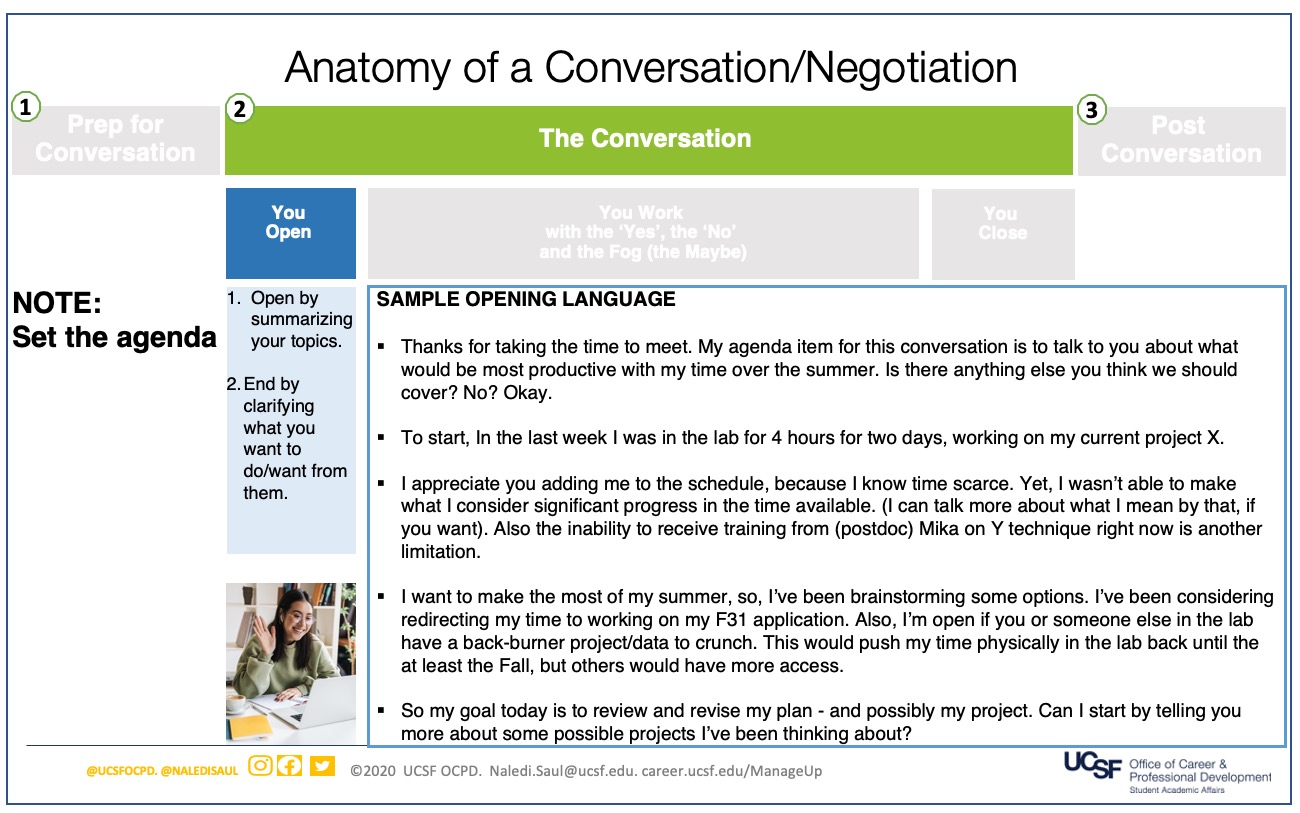 The Goal: Set the agenda for your conversation
The Goal: Set the agenda for your conversation
If you heard:
SAMPLE OPENING LANGUAGE
- Thanks for taking the time to meet. My agenda item for this conversation is to talk to you about what would be most productive with my time over the summer. Is there anything else you think we should cover? No? Okay.
- To start, In the last week I was in the lab for 4 hours for two days, working on my current project X.
- I appreciate you adding me to the schedule, because I know time scarce. Yet, I wasn’t able to make what I consider significant progress in the time available. (I can talk more about what I mean by that, if you want). Also the inability to receive training from (postdoc) Mika on Y technique right now is another limitation.
- I want to make the most of my summer, so, I’ve been brainstorming some options. I’ve been considering redirecting my time to working on my F31 application. Also, I’m open if you or someone else in the lab have a back-burner project/data to crunch. This would push my time physically in the lab back until the at least the Fall, but others would have more access.
- So my goal today is to review and revise my plan - and possibly my project. Can I start by telling you more about some possible projects I’ve been thinking about?
Slide 4: Step 2: The Conversation. Part B: You Work
The Goal: Understand your PI's thinking and what they see as barriers. Your PI will 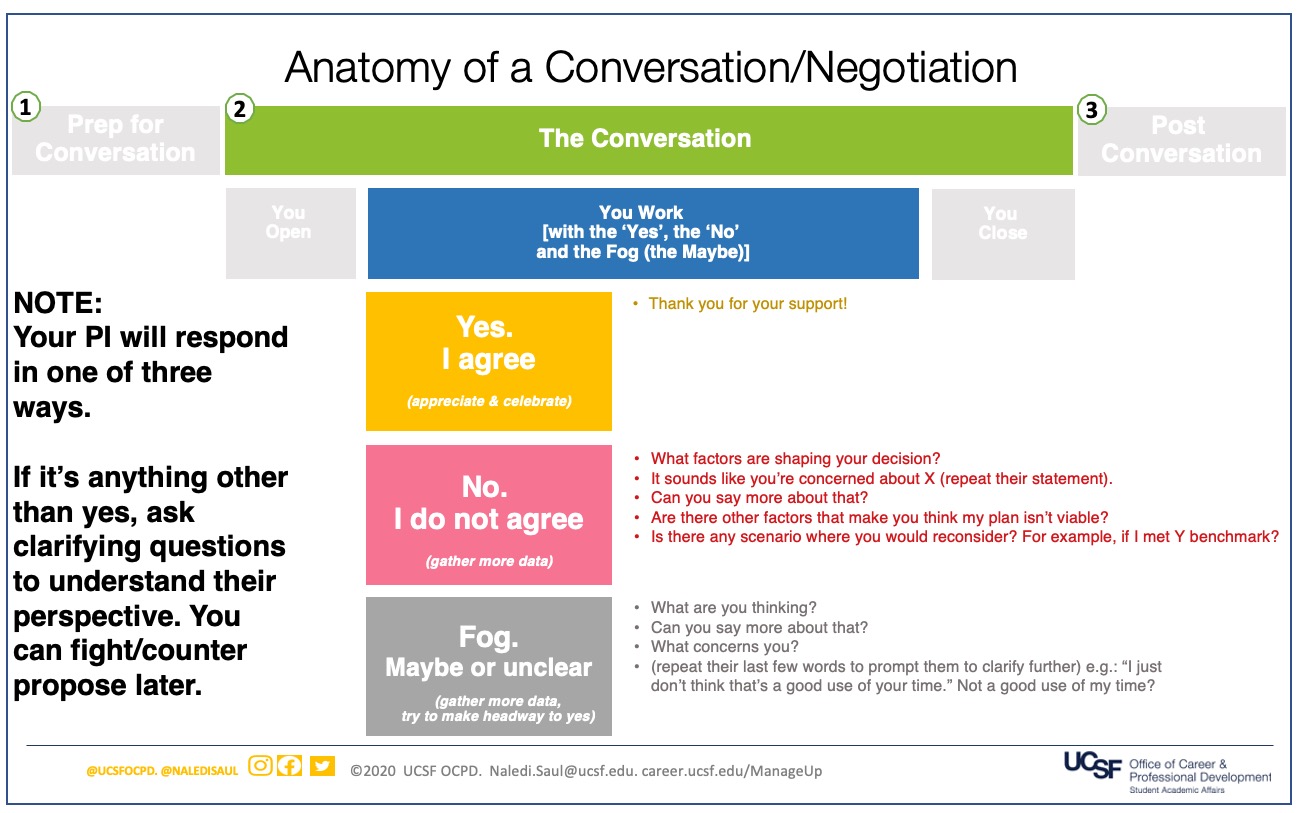 respond in one of three ways. If it is anything other than a yes, ask clarifying questions. You can disagree, argue or counter propose later.
respond in one of three ways. If it is anything other than a yes, ask clarifying questions. You can disagree, argue or counter propose later.
If you heard:
- Yes, I Agree: (Appreciate and celebrate)
- Thank you for discussing this with me. Based on our next conversation, I will do X and Y by next week
- Thank you for discussing this with me. Based on our next conversation, I will do X and Y by next week
- No, I Do Not Agree (Gather more data)
- I see. Thank you for taking the time to explain
- I understand your perspective
- You've made some good points.
- You've given me a lot to think about.
- Thank you for hearing me out.
- Thank you for considering my request.
- The Fog - Maybe or Unclear (Gather more data to make headway to yes)
- Consider what they said - their reasoning
- Reach out to other mentors and colleagues for clarity and advice
- Brainstorm other options and try again.
Slide 5: Step 2: The Conversation. Part C: You Close
The Goal: To summarize your understanding and discuss next steps 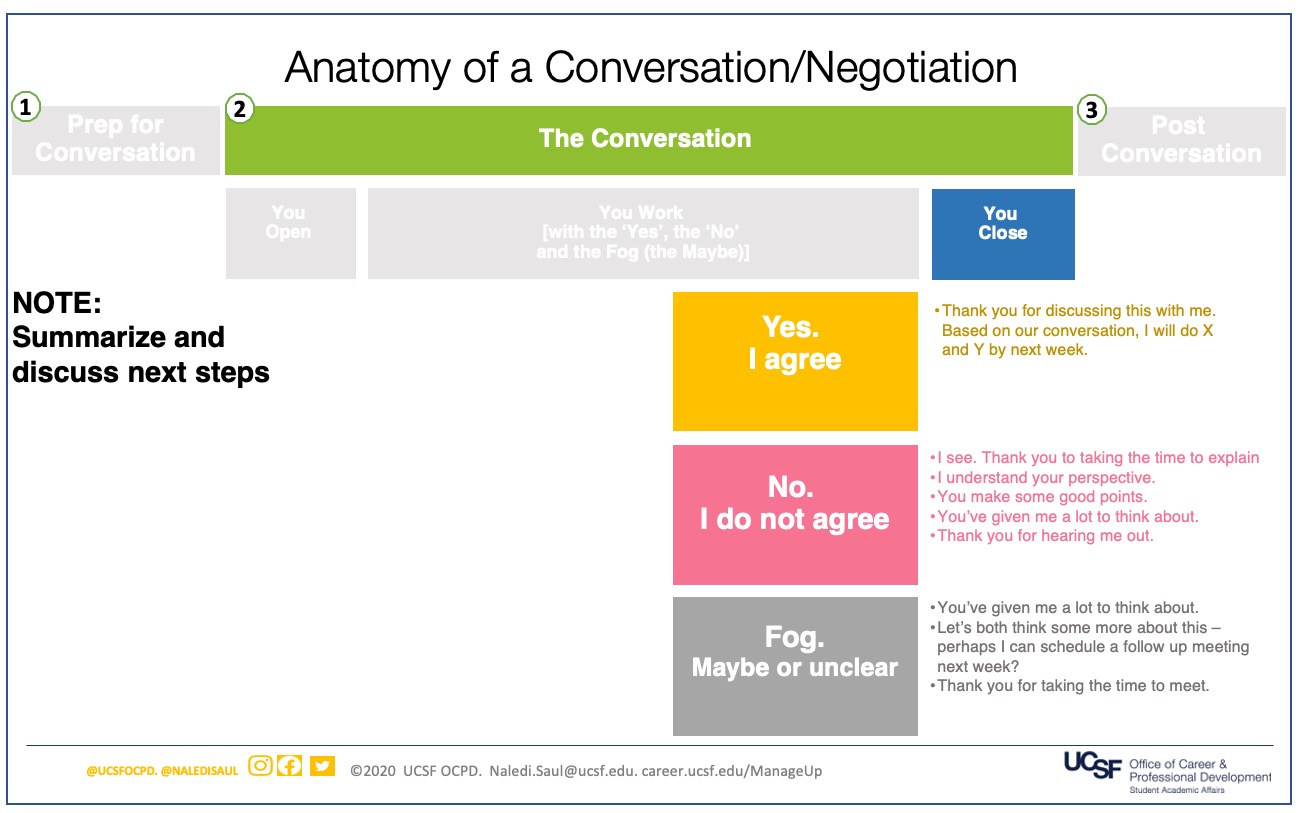
If you heard:
- Yes, I Agree: (Appreciate and celebrate)
- Thank you for discussing this with me. Based on our next conversation, I will do X and Y by next week
- Thank you for discussing this with me. Based on our next conversation, I will do X and Y by next week
- No, I Do Not Agree (Gather more data)
- I see. Thank you for taking the time to explain
- I understand your perspective
- You've made some good points.
- You've given me a lot to think about.
- Thank you for hearing me out.
- Thank you for considering my request.
- The Fog - Maybe or Unclear (Gather more data to make headway to yes)
- Consider what they said - their reasoning
- Reach out to other mentors and colleagues for clarity and advice
- Brainstorm other options and try again.
Slide 6: Step 3. Post Conversation
The Goal: Reflect, reach out To allies, and consider next steps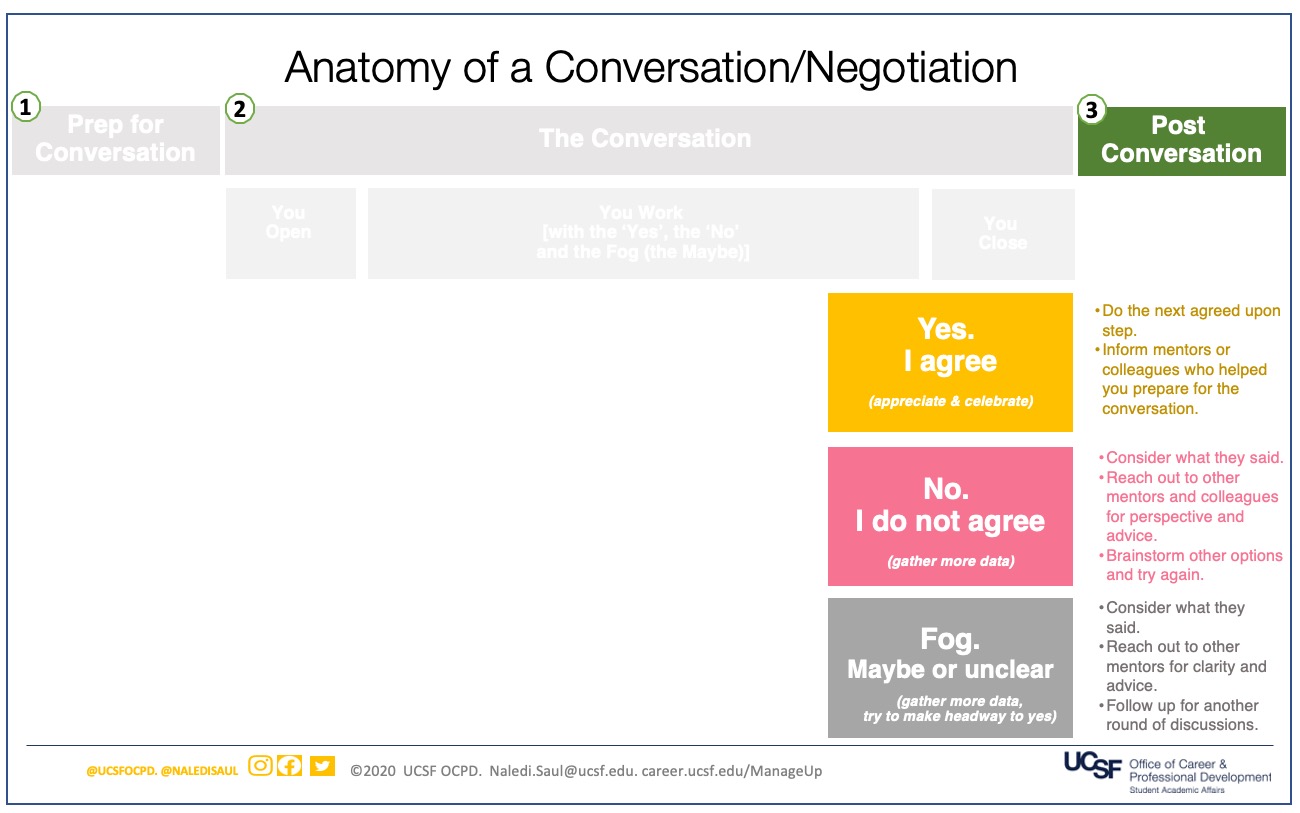
If you heard:
- Yes, I Agree: (Appreciate and celebrate)
- Do the next agreed-upon step
- Inform mentors or colleagues who helped you prepare for the conversation
- No, I Do Not Agree (Gather more data)
- Consider what they said - their reasoning
- Reach out to other mentors and colleagues for perspective and advice
- Brainstorm other options and try again.
- The Fog - Maybe or Unclear (Gather more data to make headway to yes)
- Consider what they said - their reasoning
- Reach out to other mentors and colleagues for clarity and advice
- Brainstorm other options and try again.
